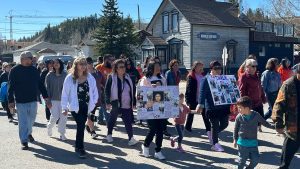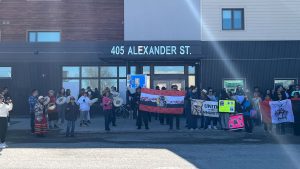A family member and First Nation of a woman who died last year while accessing services at the Whitehorse emergency shelter are expressing disappointment at the recommendations yielded from an inquest into her death.
Darla Skookum, 52, was a citizen of the Little Salmon/Carmacks First Nation (LSCFN). She died after shelter staff, who assumed she was intoxicated, put her to bed on her stomach with her face down in her pillow. None of the staff who put Skookum to bed ever went back to check on her.
“(I’m) shocked actually. Right now, I feel angry and upset, Skookum’s sister, Veronica Burgess, told APTN News. “The outcome was not very what we expected.”
Skookum’s death, as well as that of Cassandra Warville, 35, and Myranda Tizya-Charlie, 34 and Josephine Elizabeth Hager, 38, were the focus of a three-week inquest that ended Thursday.
After approximately seven hours of deliberation, the six-person jury issued eight recommendations to improve policies and training for Whitehorse emergency shelter staff.
The jury recommended a policy review be undertaken in the next six months by Connective, the non-profit that manages day-to-day operations of the shelter.
That review would ensure policies, procedures and guidelines are evidence based and provide clear direction to staff.
Other recommendations include adopting a staff training plan in the next six months, recruiting more Indigenous employees and people with lived experience and creating a safe space for LGBTQ2S+ service users.
The aim of an inquest is not to cast blame but to determine the facts surrounding a person’s death.
While frontline staff and senior management for Connective testified errors were made by putting Skookum to bed on her stomach, Burness feels there’s been a lack of “accountability.”
“EMS should have been called. For (staff) with training in CPR to put somebody down on their stomach, and on their face in the pillow, to us it’s not acceptable. It hurts us deeply that we have to sit through this and watch the video (and) how traumatizing everything is,” she said.
Burness said staff members have never personally apologized to her and her family regarding Skookum’s death.
“How my sister was treated…(Staff) never showed much care for her well-being,” she said.
The jury was also tasked with determining the women’s cause of death, all of which are linked to toxic illicit drug use.
It determined all four women’s deaths were accidental.
But Burness disagrees about her sister’s death.
“It was not accidental,” she said.
Burness points to missing camera footage from when Skookum was transferred in a wheelchair from a lounge area to an overflow sleeping area. According to shelter staff testimonies, the footage does not exist or has never been recovered.
“Something happened from the lounge area to the overflow room, and where is that (footage)? Who edited it?” Burness said.
‘We just want things to be better’

LSCFN Chief Nicole Tom said the inquest and its findings have been devastating for Skookum’s family.
“It definitely was heart-wrenching. We’ve all experienced losses. We just want things to be better,” she said.
Tom said she was shocked to learn shelter staff routinely put intoxicated people to bed on their stomach, a practise that’s continued after Skookum’s death. She said it’s vital staff have more training when dealing with intoxicated people or people under the influence of drugs.
“I know that capacity is low. I know training is necessary. It’s alarming to think that people are still being put on their stomachs as we speak, and for us…that’s not appropriate,” she said.
Meanwhile, Marc Gibson, the lawyer representing LSCFN, felt the jurors made “thoughtful” recommendations.
“I think the most important thing is that what they recommended is that First Nations and families and shelter guests be involved at every step of reviewing the training and reviewing their policies,” he said.
He noted how the weeks-long inquest had been heartbreaking for many, especially when examining evidence such as video footage of the women during their final hours.
“(It’s) really difficult evidence,” he said. “(But) I think it’s good that evidence all came to light. I think it’s good that everyone’s able to see the circumstances in the shelter and the circumstances and how these people died there.”
Connective, government reacts to findings

Kim Pettersen, Connective’s director of external communications, said in a statement it acknowledges and supports the jury’s recommendations.
She said its focus now will be reviewing the jury’s findings and planning for short, medium and long-term changes to strengthen service delivery.
“We are committed to transparency and will provide updates to the community as we reach milestones along the way,” she said. “We are confident that the Connective learnings and recommendations, once implemented, will have positive impacts that benefit service users and staff at 405 Alexander.”
Health and social services Minister Minister Tracy-Anne McPhee likewise said in a statement the territorial government, which funds the shelter, will assess the recommendations.
She said the government will also provide an update in the future about the actions it will be taking.
Women honoured with walk

On Friday, the Yukon Aboriginal Women’s Council held a unity walk and sacred fire in downtown Whitehorse in honour of the women.
The walk briefly stopped at the shelter where participants drummed and sang.
Tom, who was in attendance, said the only thing her people can do now is move forward.
“(We need to continue) to be together and holding each other up.”










